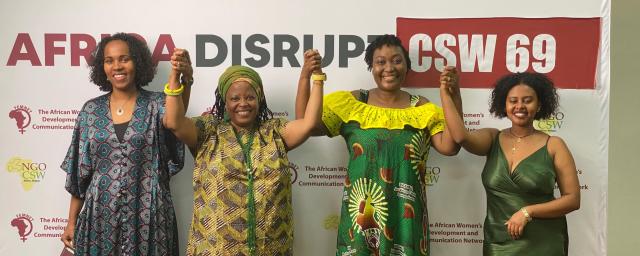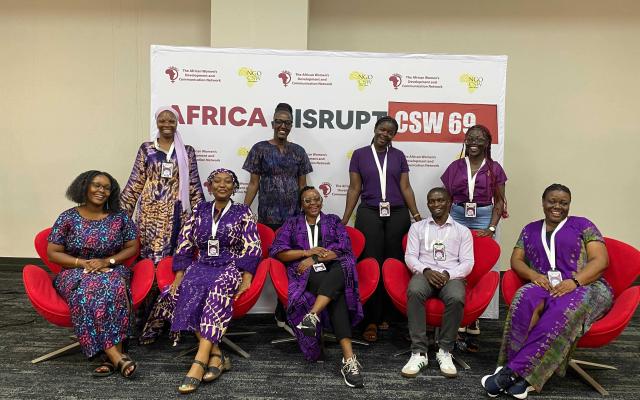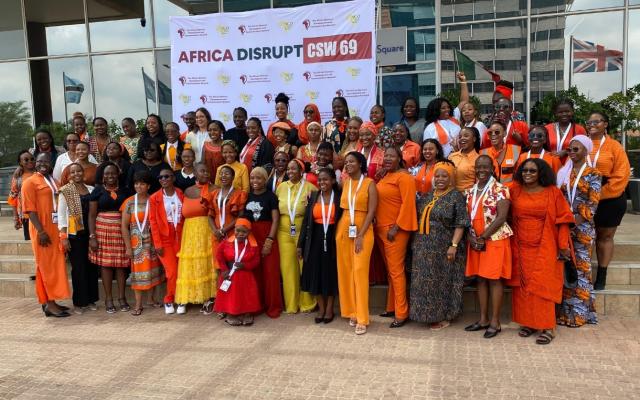
African women leaders, activists, and advocates convene in Gaborone, Botswana for the Africa Disrupt Commission on the Status of Women 69. Organized by FEMNET and partner Sustain 267, the conference assessed progress and challenges facing African girls and young women 30 years after the Beijing Declaration and Platform for Action. (Photo: FEMNET)
For nearly four decades, FEMNET has stood at the heart of Africa’s feminist movement - connecting struggles, amplifying voices, and reshaping global agendas on gender justice and women’s rights. Born in Nairobi in 1985, the network has grown into a bold pan-African force, linking grassroots realities to national, regional, and international spaces of power. Through this blog, Memory Kachambwa reflects on FEMNET’s journey, its vision of shaping the world on African women’s terms, and the urgent call to reimagine multilateral spaces that truly honor feminist principles and lived realities of diverse African women.
FEMNET’s Journey and Vision: Shaping the World on African Women’s Terms
The African Women’s Development and Communication Network (FEMNET) was born out of a defining moment in history, the third UN Conference on Women held in Nairobi in 1985, which also closed the UN Decade for Women (1976–1985). The seeds planted in that multilateral space grew into a bold, pan-African feminist network, that continues to advance women’s rights, gender justice and development in Africa and in the Diaspora. In the Herstory book, FEMNET’s founders reminisce this journey, one that connected grassroots realities and struggles to national, regional, and global movements for women’s rights to land, water, health, economy, leadership and education. Against waves of resistance, hostility and threats, fearless feminists and activists from across the continent from Egypt, Gambia, Central African Republic, Kenya, Uganda, Côte d’Ivoire, Zambia, Tanzania and beyond, generously offered their brilliance, time, and solidarity to lay the foundation of the Africa’s women’s movement. FEMNET’s ever- expanding membership has remained deeply connected, rooted in the pan-African spirit, strategizing across borders, amplifying African women’s and girls’ voices, and setting feminist agendas and priorities before, during, and long after key national, regional, and global convenings that advance gender justice.
“Everything FEMNET is, does and achieves fits into what we dreamed about. It is the fulfilment of a dream for an African women’s machinery to keep African women connected with each other. We dreamt that one day our voices would be heard and listened to in places of high authority and command. We strategized that our quest for empowerment, equality and respect of our rights would be on top of every important agenda for development, in our families, communities, nations and the world.”
By the mid-1990s, FEMNET had already established herself as a convenor of bold and strategic feminist dialogues contributing and influencing different multilateral spaces. For instance, in the lead-up to the Fourth World Conference on Women in Beijing in 1995, FEMNET played a central role in organizing the African Regional Conference and NGO Forum held in Dakar, Senegal, in 1994. This was a timely space where African women came together to interrogate the structural barriers holding back the continent’s progress, from gender inequality, poverty and structural adjustment programs, to militarization, deforestation, toxic dumping, population pressures, poor governance, language divides, and the systemic exclusion of young people from leadership.
The collective reflection in Dakar, and later in Nairobi and Addis Ababa in the early 1995 culminated in a powerful position statement, capturing the key demands and priorities of African women. This statement was refined and endorsed at the African Women’s Tentduring the Global NGO Forum in Huairou, China, and later presented to world leaders at the Beijing Conference itself. One of the significant milestones was the successful lobbying by the African delegation for the Girl Child as one of the twelve critical areas of concern in the BPFA. This milestone continues to shape advocacy and policy influencing in ending injustices faced by African girls including female genital mutilation, child marriages and gender-based violence. Post-Beijing, FEMNET members have engaged and contributed to the review processes of the Beijing Declaration and Platform for Action through the annual UN Commission on the Status of Women (CSW). Since 1996, FEMNET has contributed to the CSW preparatory meetings in Addis Ababa, Ethiopia and New York. As the lead co- facilitator of the African Women Caucus, FEMNET continues to mobilize and facilitate the active engagement of African women’s rights advocates and activists at CSW, serving as an information hub, mobilizing African women to participate, submitting written and oral statements, organizing side events, advocating for a progressive CSW outcome document and following through implementation of the recommendations by state and other non- state actors.

African women leaders, activists, and advocates convene in Gaborone, Botswana for the Africa Disrupt Commission on the Status of Women 69. Organized by FEMNET and partner Sustain 267, the conference assessed progress and challenges facing African girls and young women 30 years after the Beijing Declaration and Platform for Action. (Photo: FEMNET)
“In the past, African women civil society randomly organized themselves in the UN corridors, but now women have official space at CSW; and FEMNET plays that coordinating synergy role within the regional women’s movement.”
FEMNET continues to be intentional in influencing decisions made at national, regional and global levels, constantly ensuring African women voices are amplified and their needs, priorities and aspirations are prioritized in key policy dialogues and outcomes that have direct and indirect impact on their lives. In the last three decades, FEMNET has established her niche as a nucleus serving to mobilize African women and girls to lobby and advocate for the domestication and implementation of commitments made by African governments to the advancement of gender justice and realization of women’s rights. Such commitments include the global and continental declarations on gender justice and women’s rights that African governments are signatories to such as, the Convention on the Elimination of All forms of Discrimination against Women and Girls (CEDAW), Beijing Declaration and Platform for Action (BPfA), ICPD Programme of Action, and the 2030 Agenda on Sustainable Development (SDGs) at the global level and the Protocol to the African Charter on Human and People’s Rights on the Rights of Women in Africa (Maputo Protocol) at the regional level.
“It is very gratifying to see how FEMNET has evolved over the years to become an indispensable body linking women’s organizations in Africa, and to the outside world. In my international work within civil society and the United Nations, FEMNET has been a point of reference on African women’s participation in important global initiatives. It has always been a source of joy and encouragement knowing how FEMNET started as a tentative idea for an African women’s network.”
In the spirit of pan-Africanism, fostering regional integration and holding African governments accountable on gender equality commitments, FEMNET partnered with CRAWN Trust in November 2021 to petition the President of Kenya to action the implementation of the affirmative action of not more than two-thirds gender representation in elective and appointive positions (Article 27) through the East African Legislative Assembly (EALA) in Arusha.
Re-thinking Multilateral Dialogues
In 2025, as the world marks 30 years since the landmark BPFA, feminist movements across the globe continue to agitate for the decolonization and re-structuring of multilateral spaces to tackle the persistent inequalities, rising anti-rights rhetoric, and shrinking civic spaces. Normalized bureaucratic processes, tokenistic inclusion and hostility toward progressive human rights language have been wielded as weapons to sidetrack and dilute the impact of feminist voices. The increasing tensions between negotiators in New York and those in the Capital, who disagree on so many fronts, fragment even the small gains. There has been an increasing backlash against feminist activists in international spaces, especially from conservative and anti-gender movements, who are working to claw back hard-won gains on women’s human rights. The rise of regressive ideologies has resulted in censorship, defunding, and deliberate exclusion from decision-making spaces.
African feminists, activists and gender advocates engaging in multilateral spaces such as CSW, where global norms on gender equality and women’s empowerment are debated and contested, have long confronted entrenched and normalized systemic inequities. From the dominance of Global North agendas in New York, to the tokenistic inclusion of grassroots voices, to bureaucratic negotiations that dilute feminist demands, these spaces have not kept their promise.

African women leaders, activists, and advocates convene in Gaborone, Botswana for the Africa Disrupt Commission on the Status of Women 69. Organized by FEMNET and partner Sustain 267, the conference assessed progress and challenges facing African girls and young women 30 years after the Beijing Declaration and Platform for Action. (Photo: FEMNET)
#AfricaDisrupt was an innovative campaign to expand the exclusion of African civil society participation in CSW during and after the COVID pandemic. The rise of conservative and anti-rights forces has further intensified, leaving many feminists questioning why global advocacy feels draining, performative to tick the box and disconnected from urgent real struggles African women are leading in their grassroots communities.
The ongoing discussions around the revitalization and reforms of the CSW should therefore confront critical issues raised by feminist movements including the historical exclusion of diverse voices, limiting access due to visa restrictions and high costs in New York, and the contesting of already agreed human rights language during negotiations and drafting of the outcome documents. Revitalizing CSW should be grounded on feminist principles and guarantee real and meaningful participation of civil society representatives in all their diversity.
Looking Ahead
Globally, feminists have been calling for a systems change, collective resistance and the dismantling of patriarchal governance systems in multilateral spaces. Future multilateral spaces should be transformed to reflect the lived realities of women in all their diversities, across class, race, age, ability, sexuality, and geography. They should nurture intergenerational leadership, ensuring young feminists not only inherit the space but shape it. Outcome documents and agreements from multilateral discussions must name structural oppression - patriarchy, capitalism, neoliberalism, extractivism, racism, colonialism - and commit to dismantling them. There must be a full recognition that member states alone cannot do it alone but alongside feminist and grassroots movements. Indeed, the entire UN reform process should include feminists recommendations to:
- Institutionalize feminist representation in decision-making in all multi-lateral spaces, ensuring Global South feminist voices, their expertise, lived realities, indigenous knowledges and radical visions are recognized and included in global agendas.
- Safeguard civic space and facilitate sustainable, consistent and meaningful funding for grassroots and feminist movements.
- Embed accountability mechanisms in all multilateral spaces so that governments are held accountable to their commitments and promises, with progress systematically tracked, monitored, reported and enforced. In addition, beyond self- reporting, these spaces must create room for independent oversight led by grassroots feminist movements, especially those directly impacted by the decisions made.
- Invest in intergenerational leadership, ensuring young feminists are not just included but are fully resourced with flexible multiyear funding and trusted to lead.
- Recognize women’s human rights, economic and ecological justice, sexual and reproductive health, rights and justice (SRHRJ), women’s peace and security and elimination of gender-based violence as non-negotiable pillars for sustainable development.
- Reimagine and restructure multilateral spaces to be accountable forums of democracy, rooted in reparative and debt and tax justice.

Memory Kachambwa, the Executive Director of the African Women’s Development and Communication Network (FEMNET), is a renowned intersectional feminist and a women’s rights activist with over 20 years of experience at national, regional, and global levels. As a pan-African intersectional feminist, Memory champions gender justice, social justice, and human rights.
We extend our heartfelt appreciation to Rachel Kagoiya for her insightful perspectives and valuable contributions, which greatly enriched the development of FEMNET’s Herstory book.
For more information about FEMNET, please visit www.femnet.org.